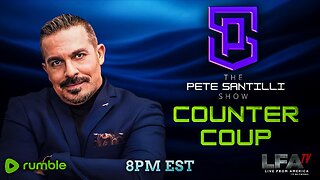Premium Only Content

Episode 3106: Let Us Not Form a Circular Firing Squad - Morning Episode
Nightly Zoom Coordinates for Rosary:
Meeting ID: 865 8978 0399
Passcode: Wjjv4960!
Speak Lord for your Servant is Listening
Book Recommendation of the Day
Biography of Saints Charles Lwanga and Companions by Rev. Fr. Emmanuel Ebe
This concise eBook offers a compelling narrative of the courage and faith of Charles Lwanga and his fellow martyrs. It provides historical context and spiritual insights into their unwavering commitment to Christianity in the face of persecution in 19th-century Uganda. The book is available in EPUB format and can be read on various devices.
So before getting into this episode I just want to caution Traditional Catholics "Let Us Not Form a Circular Firing Squad": Let’s practice Humility and Fidelity in the Traditional Catholic Movement.
As Traditional Catholics striving to remain faithful to the perennial teachings of the One, Holy, Catholic, and Apostolic Church, we are often zealous in our desire to see Her restored to reverence, orthodoxy, and discipline. This zeal is good and often born of a deep love for Christ and His Bride. However, with such zeal comes a grave responsibility: to ensure that we do not substitute personal opinion for Sacred Doctrine or Magisterial authority.
Too often, in the name of “Tradition,” some fall into the trap of treating private conclusions, personal interpretations, or emotional reactions as though they are binding Catholic doctrine. But no matter how pious or well-intentioned, if what we hold or proclaim is not firmly rooted in Sacred Scripture, Sacred Tradition, or the Magisterium of the Church particularly as taught consistently before the crisis of modernism we risk becoming like those outside the Church whom we often criticize: relying on private judgment.
Let us be reminded that personal opinion, even that of a Traditional Catholic, holds no more doctrinal weight than that of a heretical sect, if it departs from what the Church has infallibly taught or speaks without authority. When a person declares something as definitively Catholic, but it cannot be found in the Magisterium, the approved theological tradition, or the constant teachings of the saints, they are not proclaiming Catholic truth they are proclaiming themselves.
This behavior is not only dangerous for one’s own soul, but it misleads the faithful, causing confusion and often division among those who are sincerely seeking the truth.
Worse still, it undermines the very efforts to restore Tradition, as outsiders looking in see only disunity, pride, and arrogance a circular firing squad instead of a unified remnant. In such disarray, the devil rejoices, for where charity and clarity are absent, so too is effectiveness.
Let us recall the words of St. Vincent of Lérins, who gave us a safe rule for discerning true doctrine: “Quod semper, quod ubique, quod ab omnibus”—That which has been believed always, everywhere, and by all. This is our safeguard, not our own thoughts or impressions.
Let us also remember the warning of St. Augustine, who said, “You are not the Catholic Church. You are only a man.”
A Fraternal Appeal
Traditional Catholics must foster humility, not hubris. The battle for Tradition will not be won through online debates, sharp tongues, or rash judgments, but through holiness, prayer, penance, and fidelity to what the Church has always taught. We must call each other higher, but we must also resist the temptation to become judges in matters that are not ours to decide.
If we are to be soldiers in the Church Militant, let us not turn our swords on each other, especially in matters where the Church has not definitively spoken. The enemy is not our fellow Catholic seeking tradition; the enemy is confusion, modernism, pride, and the forces of Hell.
Let us not form a circular firing squad. Let us form an army of humility, fidelity, and reverence united not by personal opinion, but by truth revealed, taught, and safeguarded by Holy Mother Church.
"Anchored in Hope: Living Between Ascension and Pentecost"
Epistle – Hebrews 6:17–20
"Wherein God, willing more abundantly to show unto the heirs of the promise the immutability of His counsel, interposed Himself with an oath: That by two immutable things, in which it is impossible for God to lie, we may have the strongest comfort, who have fled for refuge to hold fast the hope set before us. Which we have as an anchor of the soul, sure and firm, and which entereth in even within the veil; where the forerunner Jesus is entered for us, made a high priest forever according to the order of Melchisedech."
Reflection on the Epistle – Hebrews 6:17–20
In this passage, the Apostle emphasizes the immutability of God's promise and presents hope as an "anchor of the soul." This anchor is both sure and firm, entering "within the veil," signifying the Holy of Holies, where Christ has entered as our High Priest.
From a traditional Catholic perspective, this underscores the steadfastness of divine promises and the centrality of hope in the Christian life. Just as an anchor holds a ship steady amidst storms, so does hope keep the soul firm amidst trials and uncertainties.
"Hope is the theological virtue by which we desire the kingdom of heaven and eternal life as our happiness, placing our trust in Christ's promises." – Catechism of the Catholic Church, 1817
Gospel – Luke 6:17–23
"And coming down with them, He stood in a plain place, and the company of His disciples, and a very great multitude of people... And He, lifting up His eyes on His disciples, said: Blessed are ye poor, for yours is the kingdom of God. Blessed are ye that hunger now, for ye shall be filled. Blessed are ye that weep now, for ye shall laugh... Rejoice ye in that day, and be glad: for behold, your reward is great in heaven."
Reflection on the Gospel – Luke 6:17–23
Jesus speaks to a multitude, delivering the Beatitudes, which highlight the blessings bestowed upon those who suffer for righteousness' sake. He proclaims blessings upon the poor, the hungry, those who weep, and those who are hated for His name's sake.
This passage emphasizes the paradox of Christian joy: that true blessedness often comes through suffering and persecution. From a traditional Catholic viewpoint, it calls the faithful to embrace trials with the assurance of heavenly reward.
"The blood of martyrs is the seed of Christians." – Tertullian
Traditional Feast Days – June 3, 2025
Saints Charles Lwanga and Companions, Martyrs
On June 3, the Church commemorates Saint Charles Lwanga and his companions, who were martyred in Uganda between 1885 and 1887 for their unwavering faith and commitment to Christian virtue. Their courage in the face of persecution serves as a powerful testament to the strength of faith.
Themes and Quotes for Meditation
• Hope as an Anchor: Trusting in God's unchanging promises.
• Embracing Suffering: Recognizing the blessings that come through trials.
• Martyrdom and Witness: Drawing inspiration from the courage of the martyrs.
• Preparation for Pentecost: Awaiting the Holy Spirit with expectant faith.
Concluding Prayer
Prayer for Perseverance and Hope
O God, who didst strengthen the blessed martyrs Charles Lwanga and his companions to remain steadfast in faith amidst persecution, grant us, we beseech Thee, the grace to anchor our souls in the hope of Thy promises. As we journey between the Ascension and Pentecost, may we, inspired by their example, await the coming of the Holy Spirit with fervent hearts. Through Christ our Lord. Amen.
-
 31:50
31:50
MattMorseTV
1 hour ago🔴Trump prepares for WAR with RUSSIA.🔴
1.27K33 -
 LIVE
LIVE
LFA TV
1 day agoBREAKING NEWS ALL DAY! | THURSDAY 9/25/25
927 watching -
 9:21
9:21
Tundra Tactical
2 hours ago $0.31 earnedThe Dumbest Gun Questions Of All Time Answered! Part 2
4.55K2 -
 1:03:58
1:03:58
TheCrucible
4 hours agoThe Extravaganza! EP: 43 (9/25/25)
104K11 -
 1:14:53
1:14:53
Kim Iversen
4 hours agoHegseth Summons Top Brass — Is War With Russia Incoming?
33.6K132 -

StoneMountain64
6 hours agoBattlefield 6 News and Extraction Gaming
48.1K -
 LIVE
LIVE
LumpyPotatoX2
1 hour agoWorld of Tanks 2.0 | Public Service Announcement - #RumbleGaming
48 watching -
 LIVE
LIVE
GritsGG
5 hours agoQuad Win Streaks w/ Bobby Poff!🫡 Most Wins in WORLD! 3600+
25 watching -
 LIVE
LIVE
Badlands Media
12 hours agoQuite Frankly Ep. 23
558 watching -
 1:31:41
1:31:41
Redacted News
4 hours agoNew Charlie Kirk Video Evidence Could Change EVERYTHING | Redacted w Natali & Clayton Morris
182K240